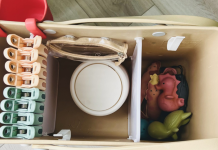
It’s the start of a new year, and the time when most of us commit to becoming better versions of ourselves. In the past, I tended to set myself up for failure, uttering general and absurd things like “I will commit to living a totally clean lifestyle until I transform into Jennifer Anniston”, or “I will journal my thoughts every day and help people until I’m mistaken for Oprah”.
Thankfully I’ve gotten better about setting realistic goals. I meal prep now and am giving a portion of my book proceeds to one of my favorite charities. I don’t have Jennifer Anniston’s abs yet, and I haven’t been given a Nobel Peace Prize, but it’s a start.
As we all sit down and think about things we want to improve upon, I want us to think about one thing we often overlook because we are too busy, too tired, or honestly just overlooking it with young children.
Are you teaching your children how to handle money?
Money wasn’t really discussed growing up in my house. We got money for chores, and the tooth fairy, and birthdays etc, but managing money? No way. When I was a little girl, I was given $20 and spent it on essential things like a new shirt or “The Bodyguard” soundtrack. (Let’s be honest, that CD was worth every penny.)
How we understand money starts at an incredibly young age. Some of the first toys we played with were those exciting cash registers with the plastic money. We play Monopoly and buy and sell plastic houses, feverishly trying to cover the board. It was fun, and there were no consequences if we got it wrong. The stakes are higher the older we get, and it’s important we set our children up with the best chance of success.
One of your own resolutions is most likely to make and save as much money as you can in 2018. But how are you relaying this relationship with money to your children? Money cannot buy happiness, but it can buy a home, and a car, and a meal. These are things your children will want and need in their lives, so helping them understand how the life they live comes to be is an essential component in their future success.
Some tips from Dave Ramsey on helping your children understand and manage money:
KINDERGARTEN/ELEMENTARY:
- Use a clear jar to save. The piggy bank is a great idea, but it doesn’t give kids any visual. When you use a clear jar, they see the money growing. Yesterday, they had a dollar bill and five dimes. Today, they have a dollar bill, five dimes and a quarter! Talk through this with them and make a big deal about it!
- Set an example. Little eyes are watching you. If you’re slapping down plastic every time you go out to dinner or to the grocery store, they will eventually notice. If at the end of every month, you and your spouse are arguing about money, they’ll notice. Set a healthy example for them, and they’ll be much more likely to follow it when they get older.
- Show them that stuff costs money. You’ve got to do more than just say, “That pack of toy cars costs $5, son.” Help them grab a few dollars out of the jar, take it with them to the store, and physically hand the money to the cashier. This simple action will do more than just a five-minute lecture.
TWEENS:
- Show opportunity cost. That’s just another way of saying, “If you buy this video game, then you won’t have the money to buy that pair of shoes.” At this age, your kids should be able to weigh decisions and realize that each decision has a consequence.
- Give commissions, not allowances. Don’t just give your kids money for breathing. Pay them commissions based on chores they do around the house like taking out the trash, cleaning their room, or mowing the grass. This will help them understand that money is earned—it’s not just given to them.
- Stress the importance of giving. Once they start making a little money, be sure you teach them about giving. They can pick a church, a charity, or even someone they know who needs a little help. Eventually, they’ll see how giving doesn’t just affect the people they give to, it affects the giver as well.
TEENAGERS:
- Give them the responsibility of a bank account. By the time your kid is a teenager, you should be able to set them up with a simple bank account if you’ve been doing some of the above all along. This takes money management to the next level, and it will prepare them for (hopefully) managing a much heftier account balance when they get older.
- “Help” them find a job. Teenagers have plenty of free time—fall break, summer break, winter break, spring break. If your teen needs money (and what teen doesn’t need money?), then help them find a job. Who knew that working was a great way to make money?
- Teach them the danger of credit cards. As soon as your kid turns 18, they will get hounded by credit card salesmen, especially once they’re in college. If you haven’t taught them why debt is a bad idea, they’ll become another credit card victim.
Remember, depending on your child’s development, you might start teaching some of these principles earlier or later.
I hope that 2018 can be an opportunity for you and your family to set and reach your goals! May your piggy bank and your heart be full!














